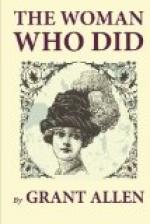As to other practical matters, about which Alan ventured delicately to throw out a passing question or two, Herminia was perfectly frank, with the perfect frankness of one who thinks and does nothing to be ashamed of. She had always been self-supporting, she said, and she would be self-supporting still. To her mind, that was an essential step towards the emancipation of women. Their friendship implied for her no change of existence, merely an addition to the fulness of her living. He was the complement of her being. Every woman should naturally wish to live her whole life, to fulfil her whole functions; and that she could do only by becoming a mother, accepting the orbit for which nature designed her. In the end, no doubt, complete independence would be secured for each woman by the civilized state, or in other words by the whole body of men, who do the hard work of the world, and who would collectively guarantee every necessary and luxury to every woman of the community equally. In that way alone could perfect liberty of choice and action be secured for women; and she held it just that women should so be provided for, because the mothers of the community fulfil in the state as important and necessary a function as the men themselves do. It would be well, too, that the mothers should be free to perform that function without preoccupation of any sort. So a free world would order things. But in our present barbaric state of industrial slavery, capitalism, monopoly,—in other words under the organized rule of selfishness,—such a course was impossible. Perhaps, as an intermediate condition, it might happen in time that the women of certain classes would for the most part be made independent at maturity each by her own father; which would produce for them in the end pretty much the same general effect of freedom. She saw as a first step the endowment of the daughter. But meanwhile there was nothing for it save that as many women as could should aim for themselves at economic liberty, in other words at self-support. That was an evil in itself, because obviously the prospective mothers of a community should be relieved as far as possible front the stress and strain of earning a livelihood; should be set free to build up their nervous systems to the highest attainable level against the calls of maternity. But above all things we must be practical; and in the practical world here and now around us, no other way existed for women to be free save the wasteful way of each earning her own livelihood. Therefore she would continue her schoolwork with her pupils as long as the school would allow her; and when that became impossible, would fall back upon literature.




